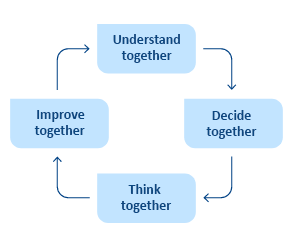Dialog with patients
At UMC Utrecht, we aim to work together with patients in a structural way, and to involve patients and their relatives in everything that we do in terms of care, research and education. We want to make decisions together, to be in line with the needs, expectations and possibilities of patients. In our approach, we work closely with a network of patients and healthcare professionals as well as UMC Utrecht client council .
We’d like to get to know you!
To enable us to offer personalized care, we have drawn up the questionnaire ‘We’d like to get to know you!’ together with patients and healthcare professionals. The questionnaire includes five questions like: What activities do you consider important, now and in the future? What worries you when it comes to your health? And, what do you expect from your treatment at UMC Utrecht? A patient can answer these questions via the patient portal My UMC Utrecht. The answers are visible to the caregiver in the Electronic Patient Record and can be used as basis for the ongoing dialog with a patient regarding the quality of care. In 2020, the questionnaire was tested in two pilot projects. In 2021, we started to implement it throughout the hospital, starting from (new) patients to 18 years with the questionnaire: We’d like to get to know you. We expect to be able to offer the questionnaire to all patients at UMC Utrecht in 2022.

Professor in Research on Patient Participation
In 2021, UMC Utrecht decided to set up a chair in Research on Patient Participation at the Julius Center. Because patient participation is not just an activity, it is also an academic field of knowledge. Within this field, we want to gather knowledge on what works and doesn't work in terms of patient participation, and what is or is not in line with patients’ needs and expectations. The new professor in Research on Patient Participation will be appointed in 2022.
Basic e-learning module in patient participation
To help our colleagues involve patients in their work in a proper and effective way, we started to develop e-learning courses in 2021. In a basis model for all staff members, we look at the importance of cooperating with patients, the difference between individual and collective patient participation, coherence between patient participation in care, education and research, and examples, exercises and advice to apply patient participation in everyday practice. This module is expected to be available as of May 2022.
E-learning on patient participation in research proposals
At UMC Utrecht there are already a lot of researchers who collaborate with patients. For others, patient participation is still a new and unknown field. In coordination with focal-point coordinators, researchers and patients, we have therefore developed an e-learning course for researchers. This e-module focuses on the start of a research study: including and writing about patient participation in your research proposal. What is the relevance of your research question and measurements for the patient? What role does the patient get in your research? And how does a patient jury assess your research proposal? This module gives practical answers and is expected to be available as of May 2022.
Ideas for improvement
Through contact with patients, little ideas for improvement often arise that can have a large impact on how a patient experiences our care. Based on feedback from patients via the focus group of the Imagery and Oncology division, a colleague may for example decide no longer to call patients from an anonymous phone for their surgery hours, but with their UMC Utrecht telephone number showing their face. Which appears to be a success, since patients like to know that it’s their doctor calling, and not for example a company that wants to sell something, and this contributes to a positive experience of telephone consultations.
On our intranet, staff can find over 100 good examples of dialog with patients at UMC Utrecht.
Patient participation in education
Patient participation is one of the pillars in the New Utrecht School. To shape and assess our education and thereby increase the quality of care and impact of research, we also make use of patients’ unique hands-on experience. This enables us to offer personalized care, with the ultimate goal to increase people’s quality of life. In Biomedical courses in 2021, we focused more than in the past on social relevance. We also started with an in-depth revision of the Medicine curriculum, where we paid particular attention to patient participation: we involve patients in the revision, and one patient is a member of the curriculum commission of the Medicine program.
In 2021 our inter-faculty education project Narratives in Medicine which originated from the New Utrecht School, was nominated for the Dutch Association for Medical Education (NVMO) prize for best educational innovation. In Narratives in Medicine, multidisciplinary education, interprofessional learning, and the patient’s perspective are central. For two weeks during this teaching cycle, students live according to patients’ treatment regimen.